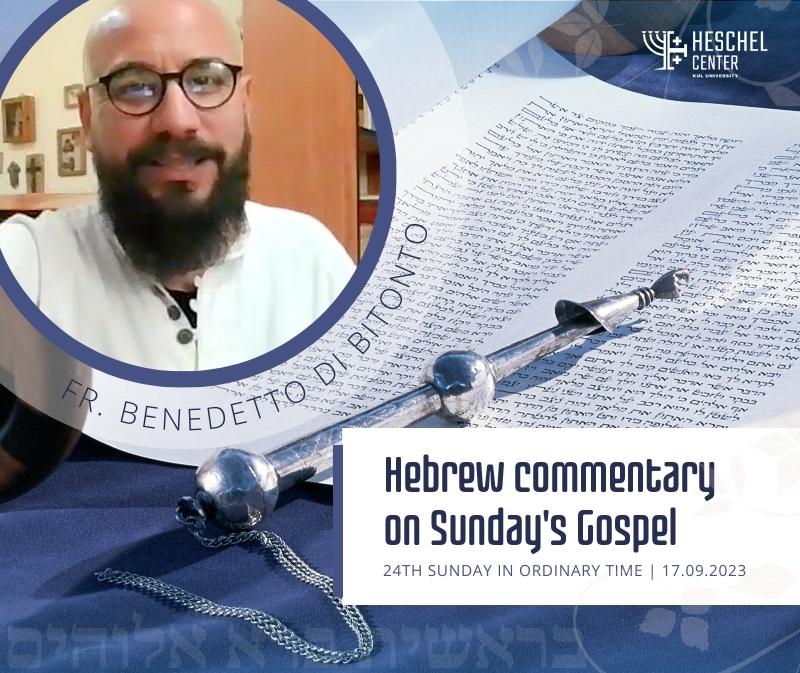Limit of forgiveness or forgiveness without limit?
 The key to understanding Jesus' answer to Peter's question about the limit of forgiveness is the parable of the merciful king and the unmerciful debtor. Jesus reveals a whole new dimension to the approach to the law, the reality that by experiencing God's boundless mercy and imitating it toward our brothers and sisters, we become like Him," writes Fr. Benedetto Di Bitonto, Ph. D., of theSaint James Vicariate for Hebrew speaking Catholics in Israel, in a commentary for the Catholic University of Lublin's Heschel Center for Sunday, September 17.
The key to understanding Jesus' answer to Peter's question about the limit of forgiveness is the parable of the merciful king and the unmerciful debtor. Jesus reveals a whole new dimension to the approach to the law, the reality that by experiencing God's boundless mercy and imitating it toward our brothers and sisters, we become like Him," writes Fr. Benedetto Di Bitonto, Ph. D., of theSaint James Vicariate for Hebrew speaking Catholics in Israel, in a commentary for the Catholic University of Lublin's Heschel Center for Sunday, September 17.
In Sunday's Gospel, Peter asks Jesus a question about how many times he should forgive. This attitude comes from a desire to "establish boundaries, a clear knowledge of being in or out, right or wrong." As Fr. Di Bitonto points out, it is at the same time evidence of Peter's immaturity at this stage of his spiritual journey.
Responding to Peter's question, Jesus tells a parable about a king who gave his servant the entire debt, even though the servant only asked for a postponement of payment. However, offered mercy, the debtor did not show it to his debtor, which deeply grieved the king and caused him anger, which he expressed in severe punishment.
Christians, through baptism, become priests, prophets, and kings, so "by practicing mutual forgiveness, opening their hearts to their neighbors, they can exercise their God-given royal authority," Fr. Di Bitonto points out.
Fr. Benedetto Di Bitonto emphasizes that Jesus shows a new aspect of the Kingdom of Heaven when addressing the question of forgiveness. "It is a reality in which people forgive each other, knowing that we are all debtors, we have all been forgiven, and we still need forgiveness," Fr. Di Bitonto writes.
Jesus' attitude is an invitation to all to follow him. "Every day we can make the Kingdom of Heaven present on earth each time we remind ourselves of God's mercy and love for us and his call for us to be like him," Fr. Benedetto Di Bitonto concludes.
The full commentary on the Gospel:
“How many times do I have to forgive my brother who sins against me?” Asks Peter. “Give me a number! After that I won’t be obliged anymore…”
This is the risk of religion, of any religion: the desire for boundaries, for a clear knowledge of being in or out, right or wrong. Our dear Peter still has got a long way to walk.
In his answer, “not seven but seventy-seven times”, Jesus is not giving a number, but a whole new attitude, and the parable he teaches then is the key to it.
“The kingdom of heaven may be likened to a king who decided to settle accounts with his servants”.
In Biblical tradition a king is supposed to meditate the Law of God, day and night, in order to become a good and just judge and shepherd his people, providing for their needs, and protecting them. This is what Biblical kingship is all about.
Now this king wants to settle accounts with his servants, and finds out that one of these owed him a huge amount. “Since he had no way of paying it back, his master ordered him to be sold, along with his wife, his children, and all his property, in payment of the debt. At that, the servant fell down, did him homage, and said, 'Be patient with me, and I will pay you back in full.' Moved with compassion the master of that servant let him go and forgave him the loan”.
We all know what follows, the forgiven servant revealed himself uncapable of doing the same with the other fellow servant, who owed him a much smaller amount. This saddened the king deeply and provoked his anger, expressed in a harsh punishment.
Jesus is teaching his disciples that like this is the Kingdom of Heaven - a reality in which fellows forgive each other, knowing that we are all debtors, we have all been forgiven and still need to forgive. This Kingdom is an invitation to imitate the good divine King, showing our likeness and similarity to Him by behaving just like Him.
We can bring forth the Kingdom of Heaven on earth every day, every time we remind ourselves of God’s Mercy and love for us and of His call to be like Him.
Christians believe that with Baptism they become Priests, Prophets and Kings. By practicing mutual forgiveness and enlarging their heart to the neighbors, they can exercise their divine kingship.
About the author:
Fr. Benedetto Di Bitonto, Ph. D., serves at the Hebrew language Catholic parish in Jerusalem, St. James' Vicariate. A native of Naples was ordained a priest in 2019 in Abu Gosh to minister to the Catholics of the Holy Land.












